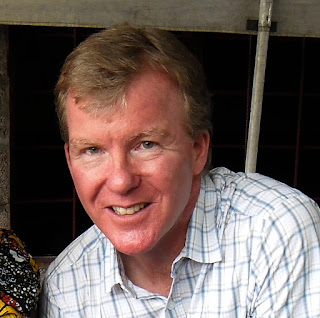I arrived in the Democratic Republic of Congo
safe and well. Chasing paperwork for my long-term missionary visa and Congolese
driving licence took a few days and direct flights to Basankusu were hit and
miss (in the end turning out to be miss). Eventually I secured a flight to
Mbandaka - on the River Congo, at the Equator - the capital of Equateur
Province - with the intention of travelling the rest of the journey by canoe
(with an outboard engine).
The day of the flight, the President of the
Congo decided to give a speech and, as a result, half of the major routes
through Kinshasa were closed. The potholes - the flooding - the traffic-jams
... we eventually made it to the airport with only minutes to spare.
Then we waited four hours before being told that
the flight had been cancelled. There was almost a riot. We travelled back in
shared taxis - each taxi has a route like a bus service ... and as many people
as possible share the ride, sometimes two to a seat. Four taxi rides got me
home. The flight was rescheduled to fly two days later and I arrived in
Mbandaka after a flight of one hour. I stayed one night at a convent and the
local Caritas group arranged for someone to cook a meal for me. They also sent
someone to help me buy bread, tinned sardines and water for my river journey.
My journey along the River Congo began at five
in the morning; I put my two suitcases and cabin bag - containing my computer
and other delicate electrical things - into what looked like a very flimsy
canoe. It was less than a metre wide - just wide enough to fit a wooden chair -
and sides that looked far too close to the water. Safety features, such as
lights, lifejackets, and so on, didn't enter the equation. I was apprehensive,
to say the least.
Once I'd made sure that my bags were installed
and covered with a plastic sheet, we set off. There were six of us including
the driver and navigator. The River Congo is one of the world's biggest rivers -
30 miles wide in places, with numerous islands. Unfortunately, the 40
horsepower engine I'd been promised - and which would get us there in a day -
needed some attention; we had to make do with a 15 horsepower engine, which
would take ... 25 hours.
We had perfect conditions on the river: the
morning started out fairly cool and I needed to put on my full waterproofs to
keep warm, but before long it had heated up into the 30s. It didn't rain at all
- and this had been my main worry because of my worries about my laptop.
We passed lots of people who were out for a
day’s fishing in their canoes. Even children know how to handle a boat and
could be seen standing up to manoeuver the canoe with a single paddle, a
younger brother or sister sitting in the bow and waving across to us. The river
lets sound carry easily across it and we could say hello to people as we
passed. What was surprising to me was that even ten miles from Mbandaka people
could still be seen talking on their phones, before the signal finally petered
out.
As we entered the branch of the River Congo
that would take us to Basankusu, the River Lulonga, a soldier stepped forward
on the riverbank. He attempted to flag us down – our driver ignored him. Then I
heard some earnest chatter from the driver and navigator and realised that we’d
attracted attention. The soldier had a gun, of course, and I thought it would
be just my luck to get shot before I arrived. A canoe was launched, one with a
better outboard engine than ours, and within a few minutes the local
authorities had come alongside. They were annoyed that we hadn’t stopped to
declare ourselves – but after a few minutes became friendly and let us go.
Being an obvious foreigner, I was probably the cause of their attention. Often,
there can be so-called ‘fees’ or ‘taxes’ to pay … but on this occasion they let
us go without charge.
The first ten hours were tolerable. As night
fell, the inability to sleep in any comfortable position became apparent to all
on board. The two feet of leg room in front of my chair served as a bed, with
my head on the wooden seat and my legs twisted various ways to fit into the
space.

During the day, of course, the landscape -
rainforest reflected in the river's mirror - was spectacular. At night, the
stars were dazzling and the river illuminated by the first quarter of the new
moon - which on the Equator sits on its back like a smiling mouth. Most of
river is surrounded by the rainforest’s towering trees, miles from any human
habitation, and the sounds of the forest animals, cricking, booming and
hooting, echo across the water.
I arrived, exhausted, at 7 am, after 25 hours
cramped up in a canoe. What I came to realise was that if Basankusu was so
difficult for me to get to, the people who live here must also feel so very isolated.
Goods arriving to be sold in the market are limited because of this isolation
and produce from people’s market gardens is difficult to send to markets
elsewhere. Once you are here, there is very little contact with the outside
world.
I was met by Fr John Kirwan MHM, who made me
very welcome.

No comments:
Post a Comment